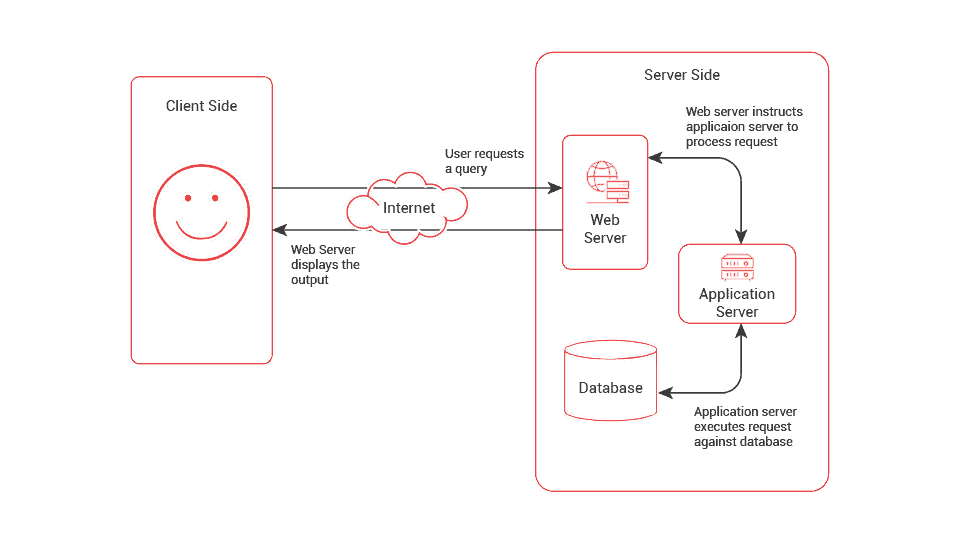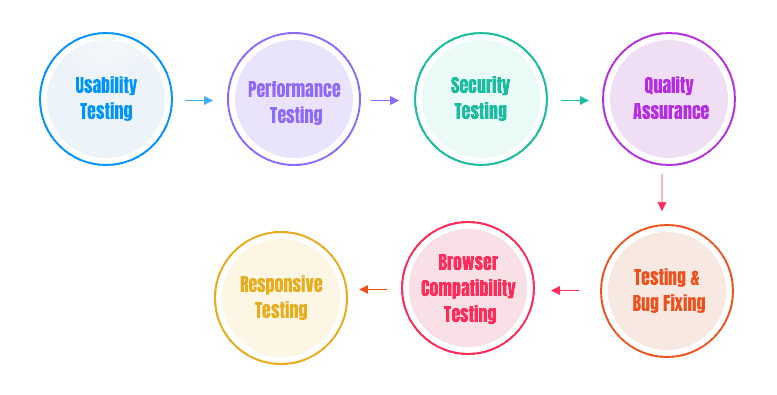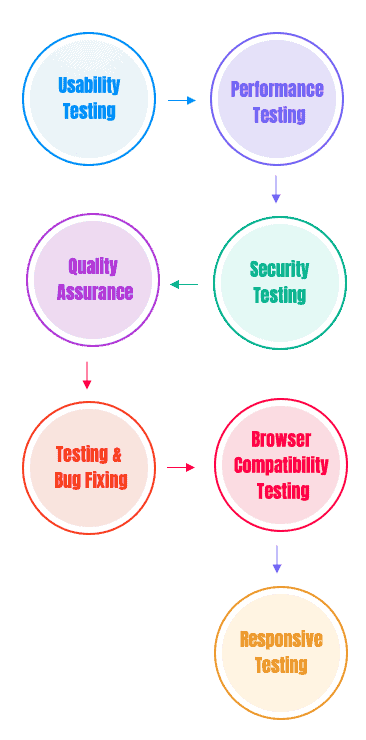Top Technologies Used to Develop Mobile App
A decade ago, web pages were mostly static, with a few images and videos scattered around. In 2005, thanks to Ajax, it made it possible to create better, faster, and more interactive web applications.
A web application, also known as a web app, is nothing but a computer program that uses a web browser to perform a specific function. A web application is a client-server program that comprises a client-side and a server-side. The user enters data through the client-side (front-end), while the server-side (back-end) of the application stores and processes the information. For example, shopping carts, content management systems, and online forms are typical web applications.
Both enterprises and individuals develop web applications to fulfill different purposes. Web apps help integrate the tailored experience of native apps with easy access on a website browser from any device. For example, LinkedIn, Basecamp, MailChimp, or even Facebook, have web apps that provide immersive and tailored experiences like the native apps directly from the browser. Hence, web application development is gaining a lot of popularity in almost all industries, including banking, eCommerce, education, healthcare, and more.



 Static Web Application
Static Web Application Dynamic Web Application
Dynamic Web Application eCommerce Web Application
eCommerce Web Application CMS Web Apps
CMS Web Apps Portal Web Application
Portal Web Application Single-Page Application
Single-Page Application Multi-Page Application
Multi-Page Application Rich-Internet Web Applications
Rich-Internet Web Applications Progressive Web Apps
Progressive Web Apps Static Web Application
Static Web Application Dynamic Web Application
Dynamic Web Application eCommerce Web Application
eCommerce Web Application CMS Web Apps
CMS Web Apps Portal Web Application
Portal Web Application Single-Page Application
Single-Page Application Multi-Page Application
Multi-Page Application Rich-Internet Web Applications
Rich-Internet Web Applications Progressive Web Apps
Progressive Web Apps


Web application comes along with an array of benefits for businesses and users.
Web application development is faster and more economical than building native apps. Therefore, if the primary goal is to accelerate time-to-market, web application development is the best choice for businesses.
Web applications are programmed to run on any operating system. Due to their cross-platform capabilities, web applications can adapt well to Android, iOS, Mac OS, and Windows phones. In addition, the device responsiveness of web applications helps to get rid of OS dependencies.
A web application runs on the device’s browser using an accessible URL. Modern web applications are compatible with all browsers, such as Google Chrome, Internet Explorer, Firefox, and Bing. Hence, software compatibility challenges are never roadblocks.
Web application development is a great way to cut down operating costs. It drives to eliminate unnecessary expenses such as hardware purchases, frequent device updates, and maintenance of numerous systems.
Updating web applications is easy, as only the server(s) would require upgrades.
Custom web application development offers several benefits, such as tailored features for the users. These applications are easily accessible via browsers with a stable internet connection. Custom web apps help cut unnecessary expenses and save time as only required features need to be developed. A custom web app can significantly improve your business traction brand awareness, communicate your brand ideology and help you gain a competitive edge in the chosen target market.
Web applications are typically deployed on dedicated servers, constantly monitored, and managed by experienced server administrators. This is more effective than monitoring hundreds or even thousands of client computers, as with desktop applications. In addition, it ensures tighter security and identifies any potential breaches that could slip off.
Web apps don’t need to be downloaded from app stores such as Apple’s App Store or Google Play. This helps save money since having a direct link through a web app is free.

1. Database Technologies

2. Client-Side Programming

3. Server-Side Programming

1. Database Technologies
Due to its simplicity and multifunctionality, MySQL is
one of the most preferred databases utilized for web application development.
Other popular database technologies include Oracle Database, PostgreSQL,
Microsoft SQL Server, Microsoft Access, MongoDB, and RavenDB.

2. Client-Side Programming
To develop the client-side of an app that the users interact with, you can choose
highly efficient front-end JavaScript frameworks such as
This is a robust and widely used JS framework for developing large-scale and complex dynamic web apps.
A popular front-end framework by Google, Angular JS is suitable for building dynamic web apps, using HTML for static web pages.
Fairly new, this JS framework does wonders for applications. Vue JS provides an ecosystem of assisting libraries and an accessible primary library for applying huge complex page apps.
This lightweight JS library has a RESTful JSON interface that follows the MVC (Model-View-Controller) application design standard. Backbone JS helps develop and structure the client-side applications in a web browser.
It is a cross-platform, open-source JS runtime that runs on the V8 engine and is designed to build scalable network applications.
An open-source JS framework ideal for developing single-page applications.

3. Server-Side Programming
Frameworks such as Go, Ruby, Java, Django & Python are some of the most
powerful back-end development technologies.
Ruby is an open-source, general-purpose, object-oriented programming language used to build highly secure and fast web applications.
PHP is a popular general-purpose scripting language that is fast, flexible, and pragmatic, suited especially for web development. It is a powerful tool for making dynamic and interactive websites.
A multi-purpose programming language, Java is leveraged for Android app development, desktop apps, and web app development. Java offers excellent security and stability.
Python is flexible, advanced, and has a low learning curve. This programming language covers back-end web development. Python, along with its framework Django, can meet back-end development tasks efficiently.
Designed by Google’s developers, Go is an open-source programming language that is fast and statistically compiled. It helps build simple, reliable, and concurrent web applications.
Whether you decide to develop your web application in-house team or outsource to a company like Fingent, your project will be more successful if you understand the process involved in web application development in advance.
The number of steps in the web application development process can vary.
The first step is to define the problem you want to solve with a web application and collect all the relevant information needed for app development. A well-defined problem will give an excellent head-start to the project and help you identify the best solution. Next, clarify the purpose and the end goals of the application.
During the planning phase, the developers will take a run to answer the following questions.
The development phase involves creating a wireframe or prototype to communicate the solution to target users.
First, the developers will lay out the design elements to provide a delightful user experience to the target audience. The wireframe is then presented to potential users, considers their feedback, and iterates until they're satisfied.
Post-design, the next step is to build the application. The following steps will happen in this phase.
Whether an automated or manual web application, testing for the web application is an ongoing process throughout the software development lifecycle. Testing is an inevitable part of the software development process.
The Testing (QA) team will test the app for usability, compatibility, functionality, security, and performance to eliminate bugs and ensure that the application works without any glitches.Testing also helps identify any possible improvements and upgrades to make in the future.Once the testing is complete, you can finally implement the application in your company or your customer's side.
When using it for your company, you will have to train your employees to use the app productively (if the app requires training). In addition, you will have to create a communication strategy for customers and decide on the appropriate timing to launch the application in the market.
At Fingent, we help you perform all the mandatory software and usability testing to ensure that your web app functions seamlessly. We also provide training and support to use the apps effectively.
You must buy a domain and choose a hosting provider to create a server location for the app. We help you choose shared hosting, dedicated hosting, or cloud hosting based on your requirements. Be it a simple website or complex web application, and every digital product needs routine checks and enhancements. Maintenance of the application or website includes:



Web development has progressed over the years and is progressing with the emergence of newer technologies. A website is the face of a business rather than mere codes. More than one-third of visitors prefer to hold on to websites with attractive content and a clean layout. In 2023, companies are more than ready to apply the latest web development trends to improve conversions and develop engaging websites without having to code. If you want to stay ahead, it is vital to focus on the latest trends, updates, techniques, and web development approaches. Why developers should bring out more innovative web development approaches- the fact is it boosts business growth rather exponentially and globally.

.NET Core gives you consistency across all architectures by running your code with the same behavior. Be it gaming, IoT, mobile, or AI – we can help you develop high-performing, secure, cost-effective, and flexible applications in any domain with .NET Core. Let’s Discuss Your Project

C# is a highly versatile programming language commonly used for developing websites, Windows applications, and games. With its foundation deep-rooted in the Microsoft platform, C# is one of the most-cherished and reliable languages to build robust applications. Let’s Discuss Your Project

ASP.NET is a framework for building web apps and services with .NET and C#. ASP.NET allows you to build large and complex applications by reducing the amount of code required. This, in turn, reduces the application development time and costs involved. Let’s Discuss Your Project

Take advantage of the cloud through hybrid cloud-based solutions with Microsoft Azure. We can help you migrate your solution to the cloud, enabling you with on-demand and secure resources of Azure. Scale according to your needs and improve your business agility. Let’s Discuss Your Project

Fingent’s Microsoft team can help you develop robust SharePoint solutions that empower your organization with efficient collaboration and communication. We can help you build intuitive interfaces and simple navigation features for effective document management. Let’s Discuss Your Project

Microsoft Power Apps enables you to build low-code, professional-grade apps that can modernize your business processes and drive innovation across your organization. Infuse your enterprise apps with AI and automation, powered by PowerApps. Let’s Discuss Your Project

Leveraging Microsoft Power BI, we enable businesses to develop interactive visualizations and business intelligence capabilities through simple and intuitive interfaces. Enrich your business as well as end-users with custom reports and dashboards powered by insightful data. Let’s Discuss Your Project

By leveraging UWP API, we help you create universal apps that run on Windows 10 compatible devices without the need to be re-written for each. As the name suggests, the Universal Windows Platform allows you to create apps that run on multiple types of devices. Let’s Discuss Your Project

Using WPF, we incorporate visually stunning user experiences into your Windows desktop applications that include features like rich user interface, media, complex business models, animation, effects, styles, templates, controls, data binding, and so on. Let’s Discuss Your Project

Our expertise with Microsoft data platforms can empower you with real-time data for improved decision-making. Our Microsoft capabilities can help in uniting several disparate information sources and create reports from across varied systems and databases. Let’s Discuss Your Project

We help you develop highly responsive and highly available applications on Cosmos DB using the popular open source software APIs. Experience low latency, high throughput, real-time responses, and tunable consistency with this multi-model, NoSQL database service. Let’s Discuss Your Project
The web development industry is in flux and is constantly evolving. Therefore, it is paramount for us always to look ahead and learn about what's coming up or any risk being left in the web development dust. Web development is defined through the upcoming trends and changes in the digital world. Businesses around the globe are in a quest to build outstanding websites to up their online presence with all-new frameworks, tools, and advancements. If you want your business to stay ahead of the race, the smartest thing u can do is to try out innovative and experimental things like Augmented Reality (AR) or Artificial Intelligence. Here's a quick glance at some of the exciting developments likely to happen in the near future.
Data Science is impacting web development positively. Data science helps extract significant user information on a large scale using statistics, analytics, artificial intelligence, and machine learning. Using the extraction of meaningful information, web development is now guided into a more fruitful system to impact the business's bottom line. With data science and machine learning, you can target the right customers with personalized content at the right time within your application.

Product visualization is the most sought-after requirement among today's customers. Augmented reality has the potential to change the shopping game. Most online shoppers prefer shopping sites to integrate some form of augmented reality for a personalized experience. AR experiences in different ways are the key for customers to become more engaged in various platforms and the digital world overall. The future is not too far, where AR experiences will move into the mainstream and cease to be viewed as a niche technology.

Pageless website is a new-age concept that takes an alternative choice on web design. The entire contents of a website are displayed on a single page with an endless scroll instead of having multiple pages. With responsive elements, guided narrative, and intuitive scrolling, users can surf the entire contents of the website with ease.

The Metaverse is the new kid on the block that seeks to bring together many different technologies to offer users a new web experience. Today, users view content on the web. But on the Metaverse, users will be immersed in the content. Thanks to technologies like Virtual Reality, Augmented Reality, Machine Learning, and other forms of Artificial Intelligence. Metaverse is the next iteration of the internet where users can navigate through a virtual space instead of the current two-dimensional screen.

The cost of a complicated and custom web application development process would again differ from pre-defined, packaged, and general-purpose applications. For example, suppose the app requires developing APIs and plugins or complex technical stacks, separate UX/UI elements, brand identity development, etc. In that case, the pricing will go up as the advantages are humongous.






A polished web app is almost a mandate for successful digital businesses today. Many apps have changed the public's perception of what they can expect and what is possible. It includes everything a typical user might look for in an app regarding design, usability, reliability, and security. Here's a rundown on five apps that has made a difference to the world.
Facebook is a free social networking website that allows people to connect with others online. It lets users share photographs, post comments, post links to interesting content on the web, live chat, and watch videos. Facebook's success is attributed to its ability to appeal to both people and businesses and its ability to interact with websites around the web by providing a single login that works across multiple sites.
WhatsApp is a free, multi-platform messaging app that lets users make video and voice calls, send text messages, share their status, and make payments, all with just an internet connection. The most appealing feature of this app is that it works on various phones and computer operating systems, which bestows uninterrupted conversations anytime, anywhere. WhatsApp serves more than 2 billion people in over 180 countries, with over a billion daily active users.
Uber is a transportation company that has developed an app to allow passengers to hail a ride, and drivers get paid. The app integrates with Google maps for tracking locations, routes and directing people to their destination. Uber uses smartphone app technology to connect passengers and drivers via a car-for-hire method. Most people love the simplicity of opening the app, telling where they want to go, and then seeing an Uber driver show up in a matter of minutes.
Instagram is a free, popular photo-sharing app that Facebook acquired in 2012. It allows users to edit and upload photos and short videos through a mobile app. Like other social networking platforms, Instagram users can like, comment, share and bookmark others' posts. It also includes a feature of private chats and video conferencing with friends.
TikTok is a social media platform that allows users to create and share short videos. A young crowd commonly uses the app as an outlet to express themselves through singing, dancing, comics, and lip-syncing, making fun videos and sharing them across a community. In addition, users can follow other users, like, and comment on other users' videos. TikTok app quickly soared to popularity and amassed over 500 million monthly active users, the US being the most popular country where it is downloaded over 80 million times.




A web application is the first point of access to your business and brand for your customers. Your app is the place that reflects what you do, your services, products, and your reputation. You can stand out from your competitors by having a web application that looks interesting and clearly communicates quality information to your customers. Therefore, hiring a professional web application development company is judicious to understand your vision and shape the application accordingly.
A company or business without a web app or website may question the legitimacy of the business. So, having an app is an opportunity to build a great first impression and give people assurance that you’re a genuine business.
Web applications play a crucial role in the branding process of a business. Showcasing your brand to your prospective customers is the key to positioning your business in the market. A web application is an underlying framework for branding your products or services because branding acts as the bridge to maintain a proper communication channel between potential customers and your business.
Clearly conveying to the customers who you are, what you provide, and what your brand represents raises your business popularity coupled with building a customer base. A web application is your brand's voice that reaches out to the world through multiple social media platforms.
Your app is one of the most powerful assets for helping business owners improve customer relationships and increase efficiency. In addition to showcasing your offering or describing who you are, your application is one of the key tools for connecting with your existing customers and keeping them engaged. In order to create customer loyalty, you need to give your customers a reason to return.
Web applications come in handy with a lot of scopes to build customer loyalty programs to win customers’ hearts. Even simple changes to your app can go a long way toward building your brand and encouraging more customers to use your app frequently. Your application can be the key to increasing customer loyalty, a critical piece of the puzzle.
As your business expands, your web applications need upgrades. Off-the-shelf applications are neither flexible nor scalable, limiting their capabilities. Custom web applications are developed specifically to suit your business requirements. It is completely scalable and flexible, harmonizing with your business growth and demands. Custom applications grow with your business without any hassles of switching to new applications or extra license purchases. Moreover, the advent of cloud-native apps further enhances the flexibility and scalability of applications by adding more value to the business.
The prompt and user-friendly customer support offered by web applications becomes more approachable and less intimidating for customers. So, the users of the app feel more comfortable with the company and are likely to stick on for a long time.
Web apps help to create an engaging space for customers to interact with brands and provide a dedicated space to track and manage all the customer support queries. The beauty of web applications is that they can be accessed at any time from any location. Hence, providing any customer assistance is never an obstacle.

Years of Experience

Centers of Excellence (CoE)

Completed Projects

Transparent Project Management

Qualified Professionals

Dedicated QA Practices
While both are good at their place, most people prefer the single-page website. This is because a single-page website offers ease of interaction and access compared to a Multi-page website.
If your business has a lot to do with queries and solutions or customer interactions, it is recommended you get a chat window.
For quality web application development, you should include both to help you avail more benefits. A combination of frameworks and pure codes will work as it will take less time and ensure quality development.
Some of the renowned web app development technologies are:
The choice to outsource or hire in-house solely depends on your specific business situation.
Hiring an in-house developer will ensure that you have complete control over the entire development process, which is definitely great for some businesses. But it also calls for long preparation time and extra expenses. On the contrary, outsourcing cuts down costs and avoids hiring new employees altogether – which can be very useful if you are short of time or money.
If your outsourcing partner is a reputable and experienced agency, you can rest assured that they will care for all your web development needs without sacrificing quality.
Years of Partnership:
Extended Team Size:
Years of Partnership:
Extended Team Size:
Years of Partnership:
Extended Team Size:
Years of Partnership:
Extended Team Size:
Years of Partnership:
Extended Team Size:
Years of Partnership:
Extended Team Size:
Contact Us
Sample Blueprint























Sample Blueprint

















